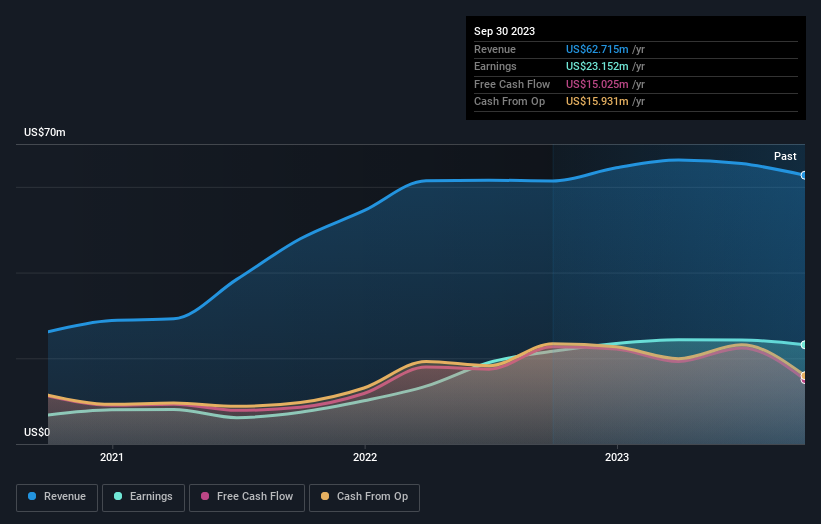Virginia National Bankshares Corporation's (NASDAQ:VABK) top owners are retail investors with 50% stake, while 38% is held by institutions
Key Insights
The considerable ownership by retail investors in Virginia National Bankshares indicates that they collectively have a greater say in management and business strategy
45% of the business is held by the top 25 shareholders
If you want to know who really controls Virginia National Bankshares Corporation (NASDAQ:VABK), then you'll have to look at the makeup of its share registry. We can see that retail investors own the lion's share in the company with 50% ownership. Put another way, the group faces the maximum upside potential (or downside risk).
Institutions, on the other hand, account for 38% of the company's stockholders. Large companies usually have institutions as shareholders, and we usually see insiders owning shares in smaller companies.
In the chart below, we zoom in on the different ownership groups of Virginia National Bankshares.
See our latest analysis for Virginia National Bankshares
What Does The Institutional Ownership Tell Us About Virginia National Bankshares?
Institutional investors commonly compare their own returns to the returns of a commonly followed index. So they generally do consider buying larger companies that are included in the relevant benchmark index.
We can see that Virginia National Bankshares does have institutional investors; and they hold a good portion of the company's stock. This implies the analysts working for those institutions have looked at the stock and they like it. But just like anyone else, they could be wrong. If multiple institutions change their view on a stock at the same time, you could see the share price drop fast. It's therefore worth looking at Virginia National Bankshares' earnings history below. Of course, the future is what really matters.
We note that hedge funds don't have a meaningful investment in Virginia National Bankshares. The Vanguard Group, Inc. is currently the company's largest shareholder with 5.4% of shares outstanding. For context, the second largest shareholder holds about 4.8% of the shares outstanding, followed by an ownership of 4.4% by the third-largest shareholder. Hunter Craig, who is the third-largest shareholder, also happens to hold the title of Member of the Board of Directors. In addition, we found that Glenn Rust, the CEO has 0.9% of the shares allocated to their name.
On studying our ownership data, we found that 25 of the top shareholders collectively own less than 50% of the share register, implying that no single individual has a majority interest.
While it makes sense to study institutional ownership data for a company, it also makes sense to study analyst sentiments to know which way the wind is blowing. We're not picking up on any analyst coverage of the stock at the moment, so the company is unlikely to be widely held.
Insider Ownership Of Virginia National Bankshares
The definition of an insider can differ slightly between different countries, but members of the board of directors always count. Management ultimately answers to the board. However, it is not uncommon for managers to be executive board members, especially if they are a founder or the CEO.
I generally consider insider ownership to be a good thing. However, on some occasions it makes it more difficult for other shareholders to hold the board accountable for decisions.
Our information suggests that insiders maintain a significant holding in Virginia National Bankshares Corporation. Insiders have a US$22m stake in this US$188m business. It is great to see insiders so invested in the business. It might be worth checking if those insiders have been buying recently.
General Public Ownership
The general public, who are usually individual investors, hold a substantial 50% stake in Virginia National Bankshares, suggesting it is a fairly popular stock. This level of ownership gives investors from the wider public some power to sway key policy decisions such as board composition, executive compensation, and the dividend payout ratio.
Next Steps:
I find it very interesting to look at who exactly owns a company. But to truly gain insight, we need to consider other information, too.
I like to dive deeper into how a company has performed in the past. You can access this interactive graph of past earnings, revenue and cash flow, for free.
If you would prefer check out another company -- one with potentially superior financials -- then do not miss this free list of interesting companies, backed by strong financial data.
NB: Figures in this article are calculated using data from the last twelve months, which refer to the 12-month period ending on the last date of the month the financial statement is dated. This may not be consistent with full year annual report figures.
Have feedback on this article? Concerned about the content? Get in touch with us directly. Alternatively, email editorial-team (at) simplywallst.com.
This article by Simply Wall St is general in nature. We provide commentary based on historical data and analyst forecasts only using an unbiased methodology and our articles are not intended to be financial advice. It does not constitute a recommendation to buy or sell any stock, and does not take account of your objectives, or your financial situation. We aim to bring you long-term focused analysis driven by fundamental data. Note that our analysis may not factor in the latest price-sensitive company announcements or qualitative material. Simply Wall St has no position in any stocks mentioned.


